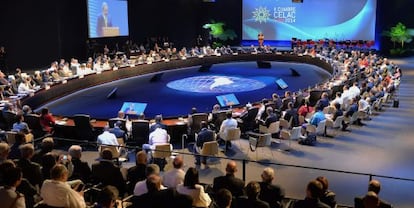Cuba pulls off diplomatic coups as host country of CELAC summit
Washington calls on Castro to release activists prevented from protesting at event

An historic summit of the Community of Latin American and Caribbean States (CELAC) kicked off on Tuesday night, with Cuba acting as host — officially welcoming the country back into regional integration. The meeting began with a call for a common front to combat poverty and hunger in Latin America and the Caribbean.
The CELAC summit is proving to be something of a diplomatic coup for President Raúl Castro’s communist government, having attracted 31 of the 33 invited leaders from the region to Havana. The United States and Canada are the only nations in the hemisphere that do not hold membership in CELAC — a regional body that was created by Venezuela’s President Hugo Chávez to counter the Organization of American States (OAS), which the late leftist leader accused of being controlled by Washington.
But despite the criticism from Cuban dissidents and human rights groups that CELAC was legitimizing the Castro regime by allowing Havana to host the summit, there has been barely any mention of the current political situation on the island.
Only two Latin American presidents stayed away: Mauricio Funes of El Salvador, who excused himself because of Sunday’s presidential elections in his country, and Ricardo Martinelli of Panama, who declined to attend in protest at last year’s capture in the Panama Canal of a North Korean ship that was carrying Cuban weapons in violation of a UN arms embargo.
There has been barely any mention of the political situation on the island
But Castro pulled off a major coup with the attendance of José Miguel Insulza, the first sitting OAS secretary general to set foot in Cuba since 1962, and Ban Ki-moon, the UN secretary general who held a private meeting with the Cuban president on Tuesday morning. The two discussed the US embargo and human rights, according to a UN statement.
The large turnout of regional heads of state was in contrast to last October’s Ibero-American Summit in Panama City, in which 12 of the 22 leaders from that body failed to show up.
In Washington, a State Department spokesman dismissed the United States’ non-participation and said that US officials have strong alliances with other regional forums and will push for greater cooperation on common issues at next year’s Summit of the Americas, which will be held in Panama.
Nevertheless, the spokesman expressed concern over the reported arrests of around 100 pro-democracy activists by Cuban authorities, who prevented them from demonstrating at the CELAC summit. “We condemn such actions and urge the government of Cuba to allow Cuban citizens to express their opinions freely, and allow them to assemble peacefully in the exercise of that right,” said the spokesperson.
In his opening remarks, Castro took swipes at the United States for maintaining what he called the “criminal blockade” against his country and for Washington’s alleged global spying activities, which were revealed last year by former US intelligence contractor Edward J. Snowden. Castro’s final message for Washington was to denounce the “colonial situation” of Puerto Rico — a US territory in the Caribbean since 1917 — saying that the Latin American community would not be complete until the island gained independence.
With regard to poverty and inequality, the Cuban president called on the countries in the region to exercise complete sovereignty over their natural resources and reconsider their business dealings with transnational corporations.
“The benefits of foreign investment are irrefutable but we forget the disproportionate growth by the returns obtained,” he said.
In an interview with EL PAÍS, Costa Rican President Laura Chinchilla said that CELAC should not been seen as a replacement for the OAS.
“Each hemispheric body — whether it is a dialogue group or an institution like the OAS — has its own dynamics, its own priorities and its own agenda. And like Costa Rica and other countries have said, CELAC isn’t here to replace or destroy the OAS; they can both continue to co-exist. But the important thing here is to nurture institutionalization in the region, which an instrument like CELAC can do,” she said.
Tu suscripción se está usando en otro dispositivo
¿Quieres añadir otro usuario a tu suscripción?
Si continúas leyendo en este dispositivo, no se podrá leer en el otro.
FlechaTu suscripción se está usando en otro dispositivo y solo puedes acceder a EL PAÍS desde un dispositivo a la vez.
Si quieres compartir tu cuenta, cambia tu suscripción a la modalidad Premium, así podrás añadir otro usuario. Cada uno accederá con su propia cuenta de email, lo que os permitirá personalizar vuestra experiencia en EL PAÍS.
¿Tienes una suscripción de empresa? Accede aquí para contratar más cuentas.
En el caso de no saber quién está usando tu cuenta, te recomendamos cambiar tu contraseña aquí.
Si decides continuar compartiendo tu cuenta, este mensaje se mostrará en tu dispositivo y en el de la otra persona que está usando tu cuenta de forma indefinida, afectando a tu experiencia de lectura. Puedes consultar aquí los términos y condiciones de la suscripción digital.








































